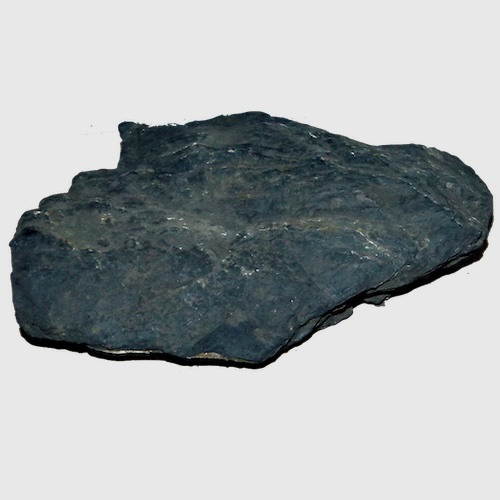Compare Niobium vs Zinc: Periodic Table Element Comparison Table and Properties
Compare the elements Niobium and Zinc on the basis of their properties, attributes and periodic table facts. Compare elements - Niobium and Zinc comparison table side by side across over 90 properties. All the elements of similar categories show a lot of similarities and differences in their chemical, atomic, physical properties and uses. These similarities and dissimilarities should be known while we study periodic table elements. You can study the detailed comparison between Niobium vs Zinc with most reliable information about their properties, attributes, facts, uses etc. You can compare Nb vs Zn on more than 90 properties like electronegativity, oxidation state, atomic shells, orbital structure, Electronaffinity, physical states, electrical conductivity and many more. This in-depth comparison helps students, educators, researchers, and science enthusiasts understand the differences and similarities between Niobium and Zinc.
Niobium and Zinc Comparison
Here's a detailed comparison between Niobium (Nb) and Zinc (Zn), focusing on their position in the periodic table, physical and chemical properties, stability, and uses.
Facts - Basic Element Details
| Name | Niobium | Zinc |
|---|---|---|
| Atomic Number | 41 | 30 |
| Atomic Symbol | Nb | Zn |
| Atomic Weight | 92.90638 | 65.409 |
| Phase at STP | Solid | Solid |
| Color | Gray | SlateGray |
| Metallic Classification | Transition Metal | Transition Metal |
| Group in Periodic Table | group 5 | group 12 |
| Group Name | vanadium family | zinc family |
| Period in Periodic Table | period 5 | period 4 |
| Block in Periodic Table | d -block | d -block |
| Electronic Configuration | [Kr] 4d4 5s1 | [Ar] 3d10 4s2 |
| Electronic Shell Structure (Electrons per shell) | 2, 8, 18, 12, 1 | 2, 8, 18, 2 |
| Melting Point | 2750 K | 692.68 K |
| Boiling Point | 5017 K | 1180 K |
| CAS Number | CAS7440-03-1 | CAS7440-66-6 |
| Neighborhood Elements | Neighborhood Elements of Niobium | Neighborhood Elements of Zinc |
History
| Parameter | Niobium | Zinc |
|---|---|---|
| History | The element Niobium was discovered by C. Hatchett in year 1801 in United Kingdom. Niobium derived its name from Niobe, daughter of king Tantalus from Greek mythology. | The element Zinc was discovered by Indian metallurgists in year Before 1000 BCE in Germany. Zinc derived its name from the German word Zink. |
| Discovery | C. Hatchett (1801) | Indian metallurgists (Before 1000 BCE) |
| Isolated | W. Blomstrand (1864) | Indian subcontinent (1000 BCE) |
Presence: Abundance in Nature and Around Us
Parts per billion (ppb) by weight / by atoms (1ppb =10^-7 %)
| Property | Niobium | Zinc |
|---|---|---|
| Abundance in Universe | 2 / 0.02 | 300 / 6 |
| Abundance in Sun | 4 / 0.05 | 2000 / 30 |
| Abundance in Meteorites | 190 / 30 | 180000 / 44000 |
| Abundance in Earth's Crust | 17000 / 3700 | 79000 / 25000 |
| Abundance in Oceans | 0.001 / 0.000067 | 5 / 0.47 |
| Abundance in Humans | - / - | 33000 / 3200 |
Crystal Structure and Atomic Structure
| Property | Niobium | Zinc |
|---|---|---|
| Atomic Volume | 10.841 cm3/mol | 9.161 cm3/mol |
| Atomic Radius | 198 pm | 142 pm |
| Covalent Radius | 137 pm | 131 pm |
| Van der Waals Radius | - | 139 pm |
Atomic Spectrum - Spectral Lines | ||
| Emission Spectrum |  |  |
| Absorption Spectrum |  |  |
| Lattice Constant | 330.04, 330.04, 330.04 pm | 266.49, 266.49, 494.68 pm |
| Lattice Angle | π/2, π/2, π/2 | π/2, π/2, 2 π/3 |
| Space Group Name | Im_ 3m | P63/mmc |
| Space Group Number | 229 | 194 |
| Crystal Structure | Body Centered Cubic 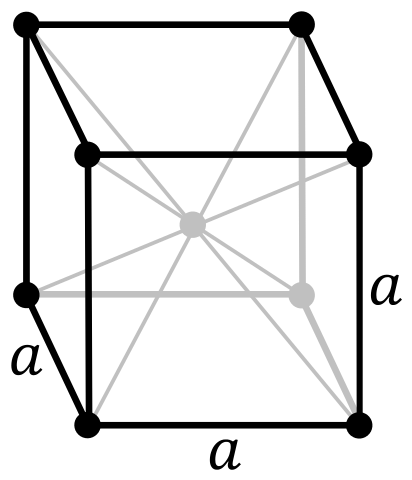 | Simple Hexagonal 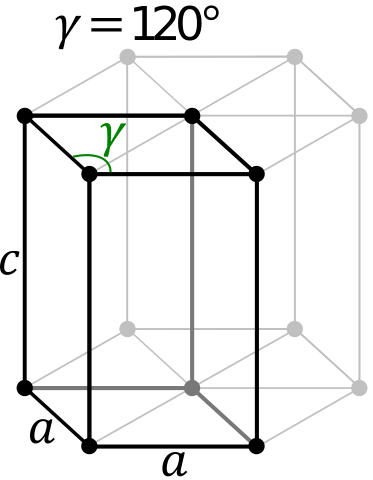 |
Atomic and Orbital Properties
| Property | Niobium | Zinc |
|---|---|---|
| Atomic Number | 41 | 30 |
| Number of Electrons (with no charge) | 41 | 30 |
| Number of Protons | 41 | 30 |
| Mass Number | 92.90638 | 65.409 |
| Number of Neutrons | 52 | 35 |
| Shell structure (Electrons per energy level) | 2, 8, 18, 12, 1 | 2, 8, 18, 2 |
| Electron Configuration | [Kr] 4d4 5s1 | [Ar] 3d10 4s2 |
| Valence Electrons | 4d4 5s1 | 3d10 4s2 |
| Oxidation State | 5 | 2 |
| Atomic Term Symbol (Quantum Numbers) | 6D1/2 | 1S0 |
| Shell structure | 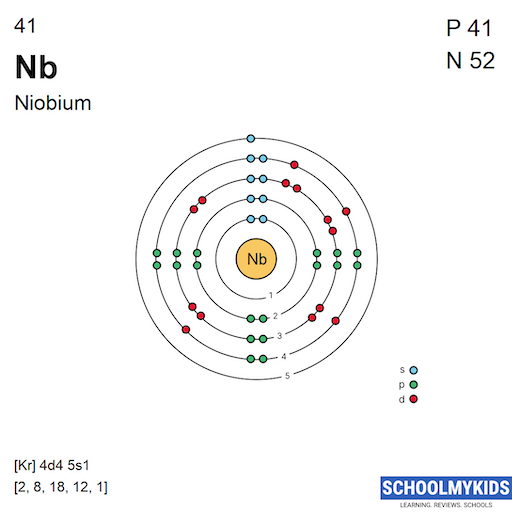 | 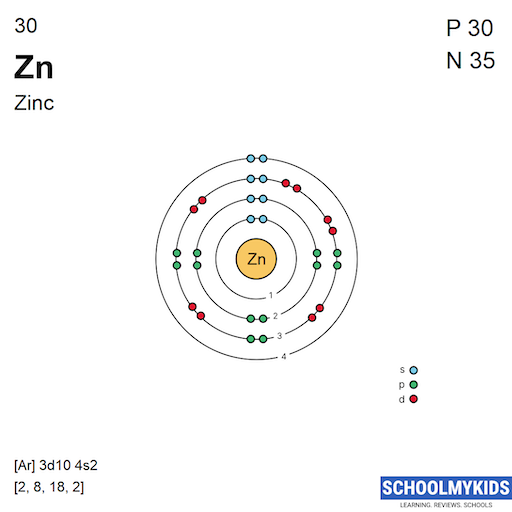 |
Isotopes and Nuclear Properties
Niobium has 1 stable naturally occuring isotopes while Zinc has 5 stable naturally occuring isotopes.
| Parameter | Niobium | Zinc |
|---|---|---|
| Known Isotopes | 81Nb, 82Nb, 83Nb, 84Nb, 85Nb, 86Nb, 87Nb, 88Nb, 89Nb, 90Nb, 91Nb, 92Nb, 93Nb, 94Nb, 95Nb, 96Nb, 97Nb, 98Nb, 99Nb, 100Nb, 101Nb, 102Nb, 103Nb, 104Nb, 105Nb, 106Nb, 107Nb, 108Nb, 109Nb, 110Nb, 111Nb, 112Nb, 113Nb | 54Zn, 55Zn, 56Zn, 57Zn, 58Zn, 59Zn, 60Zn, 61Zn, 62Zn, 63Zn, 64Zn, 65Zn, 66Zn, 67Zn, 68Zn, 69Zn, 70Zn, 71Zn, 72Zn, 73Zn, 74Zn, 75Zn, 76Zn, 77Zn, 78Zn, 79Zn, 80Zn, 81Zn, 82Zn, 83Zn |
| Stable Isotopes | Naturally occurring stable isotopes: 93Nb | Naturally occurring stable isotopes: 64Zn, 66Zn, 67Zn, 68Zn, 70Zn |
| Neutron Cross Section | 1.15 | 1.1 |
| Neutron Mass Absorption | 0.0004 | 0.00055 |
Chemical Properties: Ionization Energies and electron affinity
| Property | Niobium | Zinc |
|---|---|---|
| Valence or Valency | 5 | 2 |
| Electronegativity | 1.6 Pauling Scale | 1.65 Pauling Scale |
| Oxidation State | 5 | 2 |
| Electron Affinity | 86.1 kJ/mol | 0 kJ/mol |
| Ionization Energies | 1st: 652.1 kJ/mol 2nd: 1380 kJ/mol 3rd: 2416 kJ/mol 4th: 3700 kJ/mol 5th: 4877 kJ/mol 6th: 9847 kJ/mol 7th: 12100 kJ/mol | 1st: 906.4 kJ/mol 2nd: 1733.3 kJ/mol 3rd: 3833 kJ/mol 4th: 5731 kJ/mol 5th: 7970 kJ/mol 6th: 10400 kJ/mol 7th: 12900 kJ/mol 8th: 16800 kJ/mol 9th: 19600 kJ/mol 10th: 23000 kJ/mol 11th: 26400 kJ/mol 12th: 29990 kJ/mol 13th: 40490 kJ/mol 14th: 43800 kJ/mol 15th: 47300 kJ/mol 16th: 52300 kJ/mol 17th: 55900 kJ/mol 18th: 59700 kJ/mol 19th: 67300 kJ/mol 20th: 71200 kJ/mol 21st: 179100 kJ/mol |
Physical Properties
Zinc (7.14 g/cm³) is less dense than Niobium (8.57 g/cm³). This means that a given volume of Niobium will be heavier than the same volume of Zinc. Niobium is about 20 denser than Zinc
| Property | Niobium | Zinc |
|---|---|---|
| Phase at STP | Solid | Solid |
| Color | Gray | SlateGray |
| Density | 8.57 g/cm3 | 7.14 g/cm3 |
| Density (when liquid (at melting point)) | - | 6.57 g/cm3 |
| Molar Volume | 10.841 cm3/mol | 9.161 cm3/mol |
Mechanical and Hardness Properties
| Property | Niobium | Zinc |
|---|---|---|
Elastic Properties | ||
| Young Modulus | 105 | 108 |
| Shear Modulus | 38 GPa | 43 GPa |
| Bulk Modulus | 170 GPa | 70 GPa |
| Poisson Ratio | 0.4 | 0.25 |
Hardness - Tests to Measure of Hardness of Element | ||
| Mohs Hardness | 6 MPa | 2.5 MPa |
| Vickers Hardness | 1320 MPa | - |
| Brinell Hardness | 736 MPa | 412 MPa |
Thermal and Electrical Conductivity
| Property | Niobium | Zinc |
|---|---|---|
Heat and Conduction Properties | ||
| Thermal Conductivity | 54 W/(m K) | 120 W/(m K) |
| Thermal Expansion | 0.00000729 /K | 0.0000302 /K |
Electrical Properties | ||
| Electrical Conductivity | 6700000 S/m | 17000000 S/m |
| Resistivity | 1.5e-7 m Ω | 5.9e-8 m Ω |
| Superconducting Point | 9.25 | 0.85 |
Magnetic and Optical Properties
| Property | Niobium | Zinc |
|---|---|---|
Magnetic Properties | ||
| Magnetic Type | Paramagnetic | Diamagnetic |
| Curie Point | - | - |
| Mass Magnetic Susceptibility | 2.76e-8 m3/kg | -2.21e-9 m3/kg |
| Molar Magnetic Susceptibility | 2.56e-9 m3/mol | -1.45e-10 m3/mol |
| Volume Magnetic Susceptibility | 0.000237 | -0.0000158 |
Optical Properties | ||
| Refractive Index | - | 1.00205 |
Acoustic Properties | ||
| Speed of Sound | 3480 m/s | 3700 m/s |
Thermal Properties - Enthalpies and thermodynamics
| Property | Niobium | Zinc |
|---|---|---|
| Melting Point | 2750 K | 692.68 K |
| Boiling Point | 5017 K | 1180 K |
| Critical Temperature | - | - |
| Superconducting Point | 9.25 | 0.85 |
Enthalpies | ||
| Heat of Fusion | 26.8 kJ/mol | 7.35 kJ/mol |
| Heat of Vaporization | 690 kJ/mol | 119 kJ/mol |
| Heat of Combustion | - | - |
Regulatory and Health - Health and Safety Parameters and Guidelines
| Parameter | Niobium | Zinc |
|---|---|---|
| CAS Number | CAS7440-03-1 | CAS7440-66-6 |
| RTECS Number | RTECSQT9900000 | RTECSZG8600000 |
| DOT Hazard Class | - | 4.3 |
| DOT Numbers | - | 1436 |
| EU Number | - | - |
| NFPA Fire Rating | - | 0 |
| NFPA Health Rating | - | 2 |
| NFPA Reactivity Rating | - | 0 |
| NFPA Hazards | - | Water Reactive |
| AutoIgnition Point | - | 460 °C |
| Flashpoint | - | - |
Compare Niobium and Zinc With Other Elements
Compare Niobium and Zinc with other elements of the periodic table. Explore howNiobium and Zinc stack up against other elements of the periodic table. Use our interactive comparison tool to analyze 90+ properties across different metals, non-metals, metalloids, and noble gases. Understanding these differences is crucial for applications in engineering, chemistry, electronics, biology, and material science.
